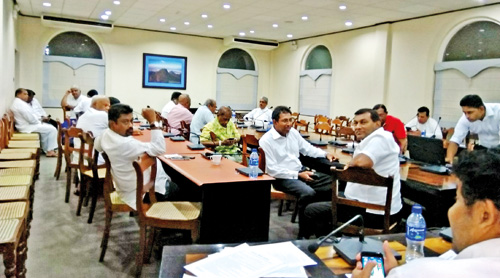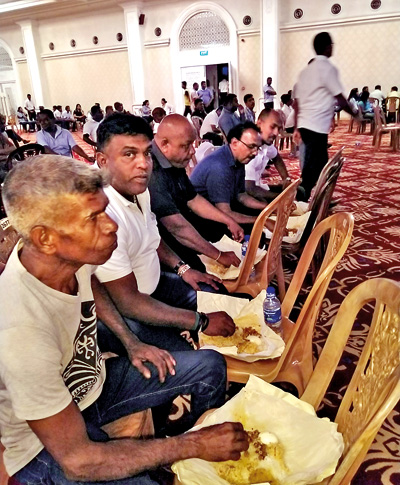News
The unsung people’s resistance movement at Temple Trees
Since October 26, Temple Trees has been a camping ground for United National Party (UNP) supporters who see themselves as defenders of its beleaguered resident, Ranil Wickremesighe.

Hive of activity. The cabinet room
“Why am I here?” said 62-year-old Manel Jayasuriya from Maharagama. “To protect the Prime Minister.”
“To lessen my pain,” interjected 68-year-old Chandrasena Waduge, also from the same area.
“We are ready to die to prevent the Prime Minister from being evicted,” declared Colombo resident M Sivakumar who has spent day and night at Temple Trees since the crisis broke. The 47-year-old has lost his job at a construction site because he hadn’t turned up for work.
The people mostly congregate in the long function hall, with its garish, patterned carpet. There are fewer in the mornings, just handfuls of supporters sitting idly in pockets. The room transforms at night. The air conditioning is switched on. People park in plastic chairs below the stage, glued to TNL news telecasts on a giant television screen.
Breakfast, lunch and dinner packs are served, on the dot. There is enough bottled water. Nescafe machines are routinely refilled. At teatime, there are short-eats like fish buns. After media highlighted how garbage was piling up, Colombo Municipal Council dump trucks visit twice a day. It’s just as well the council is UNP-controlled.
But some recalled how both water and electricity supply was curtailed on October 27 and 28. “They came to power with our votes and even took away our water,” said 42-year-old Kumari Karunaratne from Gampaha.
“The President doesn’t see that his legal spouse is Ranil Wickremesinghe, who was sworn in before him legally,” said an irate Sriyani Perera, a 58-year-old UNP member who heads an organization for women victims of political injustice. “He cannot sneak in a sidepiece like Mahinda Rajapaksa and expect it to be ok.”
Sriyani said she won’t budge from Temple Trees. Like many others, she said she would “die fighting to protect democracy”. It was difficult to gauge how much of this was rhetoric. But several times during the past three weeks, the supporters–reacting to rumours– have surged towards the exits and entry points of Temple Trees to defend the gates.
It even happened on Friday afternoon. As ugly battles erupted inside Parliament in Sri Jayawardenapura Kotte, those glued to television screens at Temple Trees heard whispers that Mahinda Rajapaksa’s crowds were on their way. They flocked towards the gates but were pacified by Special Task Force personnel who urged them to return to the hall.

It's dinner time in the main hall
The political polarization is stark and alarming. People are nervous. They speak of spies from the opposing side. One man was “caught” and handed over to the security division on Friday after he was seen taking video calls and scanning the area with his mobile phone. The anger UNP backers feel at what has happened is almost palpable. So is their sense of betrayal.
“If we had lost at an election, I wouldn’t feel this level of grief,” said a man from Biyagama, while eating his dinner of rice and curry using a plastic chair as a makeshift table. “If we had lost a no-confidence motion in Parliament, I still wouldn’t be this sad. We are devastated that we made Maithripala Sirisena the President with UNP votes and he did this.”
This was a common theme at Temple Trees. People repeatedly lamented at having squandered “good UNP votes” to help elect Mr Sirisena at the last Presidential poll. Those 6.2 million votes he got were mostly for the UNP, they said.
Members of Parliament amble in and out of the hall. They are mobbed for selfies and news. But the nerve centre of UNP operations is not accessible to the public. The main office is entered through separate gates which are manned by the Prime Ministerial Security Division (PMSD)–and there are certainly more than the reported 10 personnel there.
The porch and driveway, with its gnarled old frangipani trees, of this “inner sanctum” are populated with local government and provincial council members, and other mid-level UNP officials. They are there to express solidarity, said Priyadharshai Ariyaratne, a Kotte Municipal Council Member.
Anoma Nakandala from the Horana Pradeshiya Sabha has been travelling to and from her home town nearly every day. It is often past 1am when she gets back, she said. But she will keep coming because in this situation, she “does not feel like staying at home”.
Inside the stately building on Friday night, UNP MPs are waiting in the Cabinet room for Mr Wickremesinghe to return from another meeting elsewhere in the premises. Among them is Gamini Jayawickrama Perera in a cheerful green and yellow shirt. His left eye is still red from the chili-and-water attack he had sustained in Parliament earlier in the day. He said he would see the doctor later.
Ravi Karunanayake and Malik Samarawickrama–who has a plaster on his face over an injury he, too, received in Parliament– stroll through the corridor near the Prime Minister’s private office. This area is eerily quiet. There is nobody along the long passages. Only koi, swimming in the fish ponds, amidst the lotus plants.
In a secluded corner of the manicured lawn, six Buddhist monks recite prayers under a Bo tree lit by floodlights. There is a small crowd, palms together and eyes directed skywards. “Bodhi poojawak,” explained a member of the PMSD, quietly. Priests had also chanted pirith 24 hours a day too but that ended on Thursday.
Back in the hall, the crowds are preparing for another night in the rough. They sleep on chairs, on plastic sheets, on the carpet, even sheets of carboard. Among them is Dr Sinnaraja Vijeyarajan, a doctor from Kilinochchi. He has been at Temple Trees for 19 days.
“On October 27, I was one of the first to enter this hall,” he narrated, looking around. “I took leave from my workplace in Colombo.” During the initial days, he had organised crowds to come to Temple Trees from Kilinochchi. But as the days turned into weeks, it was not possible to sustain attendance because everyone had something to do.
It is likely that the crowds will lessen in coming days. But if Mr Wickremesinghe wants Temple Trees to turn into a “symbol of political resistance”–as he has said he does–he has, at least for now, succeeded. How long this will continue and in what manner the standoff will end remains to be seen.
Kankanige Susantha Perera, a 52-year-old businessman, admits that there are fewer people now than there were before. “But large numbers still stay overnight, in the fear that the President or illegal Prime Minister will try to get hold of Temple Trees,” he said.
“We are peaceful, here, we don’t cause trouble,” Mr Perera added. “We sing at night. We enjoy ourselves. But we also know it is the darkest hour for this country and we are alert to respond to any possible incidents.”

